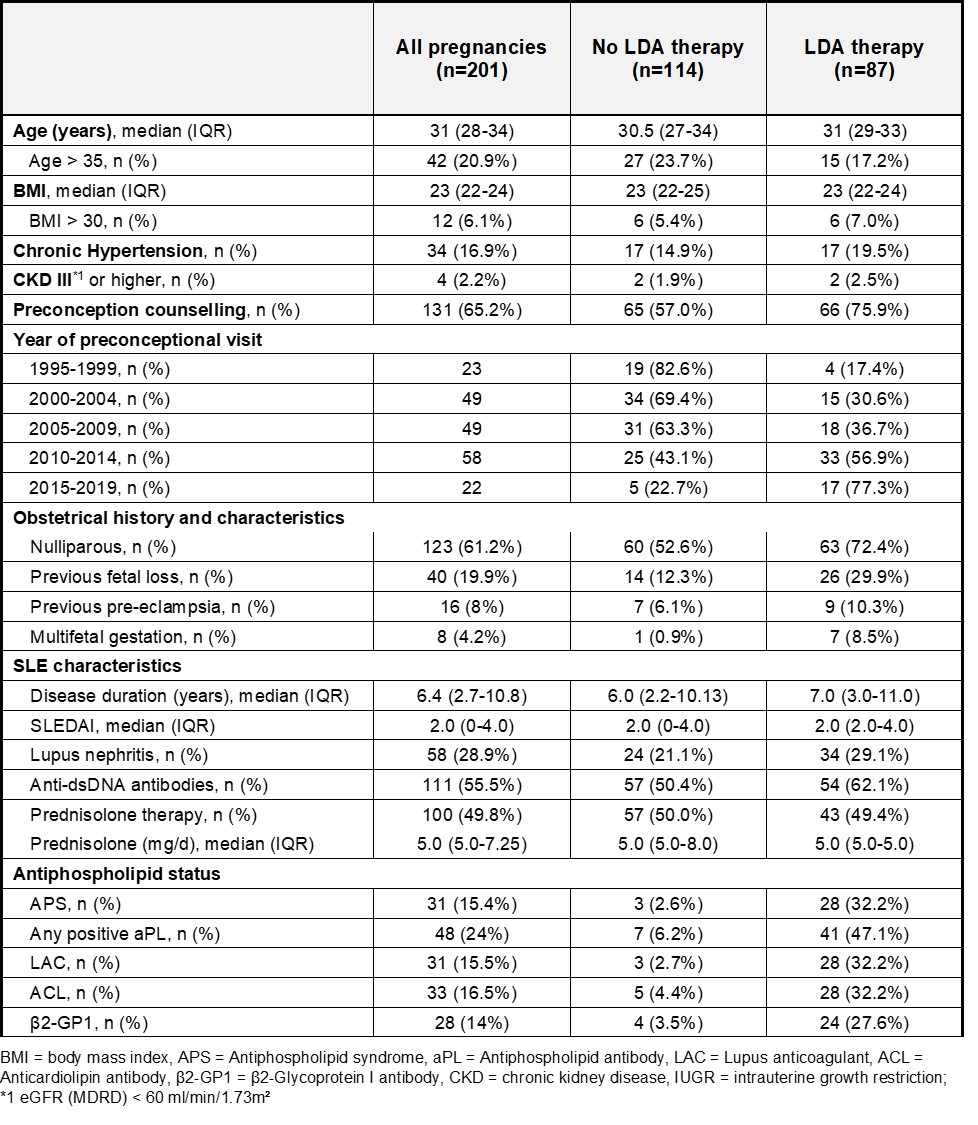Session Information
Session Type: Poster Session D
Session Time: 9:00AM-11:00AM
Background/Purpose: Women with Systemic Lupus Erythematosus (SLE) face a higher risk of pre-eclampsia, especially those with additional risk factors. Low dose aspirin (LDA) is known to protect against pre-eclampsia in non-autoimmune patients. Consequently, the EULAR recommends starting LDA in those women at risk preconceptionally or latest until gestational week 16. We sought to examine the use of LDA in a real-world cohort in relation to different risk factors and the provision of preconception counselling.
Methods: Pregnancies of women with SLE from an outpatient pregnancy clinic were evaluated before and throughout pregnancy. Clinical characteristics including pre-eclampsia risk factors, disease activity (SLEDAI) and medication use were analysed. Association of Aspirin use (latest from week 16 on) with different risk factors or preconception counselling was analysed using χ² tests.
Results: We enrolled 201 pregnancies in 136 women. 57.8% of pregnancies showed a high-risk profile for pre-eclampsia (history of pre-eclampsia, multifetal gestation, chronic hypertension, lupus nephritis or aPL), another 26.6% had at least one moderate risk factor (nulliparous, body mass index >30 or age >35).
LDA was administered in 43.3% of pregnancies. LDA use was significantly higher in those with a high-risk profile (63.5% vs. 16.7%) [OR 8.59 (95%-CI: 4.19-18.62), p< 0.001], but not in those with a moderate-risk profile. Still, 36.5% of those at high risk and 83% of those at moderate risk did not receive Aspirin. In a descending order, aPL, multifetal gestation, lupus nephritis and nulliparity were associated with a higher LDA use, whereas the other risk factors were not.
Preconception counselling significantly increased Aspirin administration [OR 2.36 (95%-CI: 1.23-4.63), p< 0.01], especially in those at high risk [OR 4.12 (95%-CI 1.72-10.16), p< 0.001]. Overall, LDA use increased from 1995 to 2019 (χ² test for trend in proportions, p< 0.001).
Conclusion: We found a high prevalence of pre-eclampsia risk factors in our real-world cohort of pregnant SLE patients, which was contrasted by an overall infrequent use of LDA during pregnancy. Preconception counselling prior to conception allows more women, especially those with an additional risk profile, to receive LDA at an early stage, which may contribute to a better pregnancy outcome.
 Table 1: Patient characteristics and pre-conceptional risk profile
Table 1: Patient characteristics and pre-conceptional risk profile
To cite this abstract in AMA style:
Haase I, Schneider M, Brinks R, Fischer-Betz R. Low Dose Aspirin to Prevent Pre-eclampsia in SLE Pregnancies – Counselling Helps to Realize Our Full Potential [abstract]. Arthritis Rheumatol. 2020; 72 (suppl 10). https://acrabstracts.org/abstract/low-dose-aspirin-to-prevent-pre-eclampsia-in-sle-pregnancies-counselling-helps-to-realize-our-full-potential/. Accessed .« Back to ACR Convergence 2020
ACR Meeting Abstracts - https://acrabstracts.org/abstract/low-dose-aspirin-to-prevent-pre-eclampsia-in-sle-pregnancies-counselling-helps-to-realize-our-full-potential/
